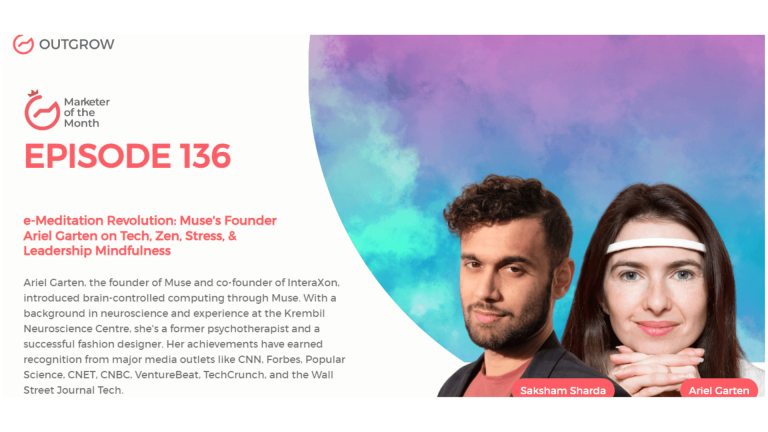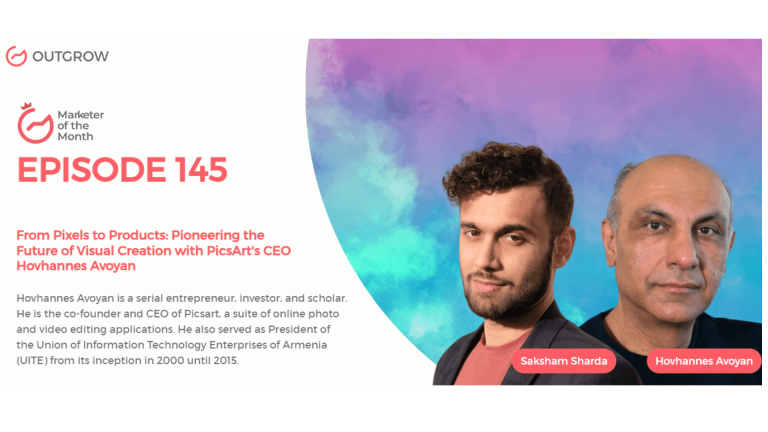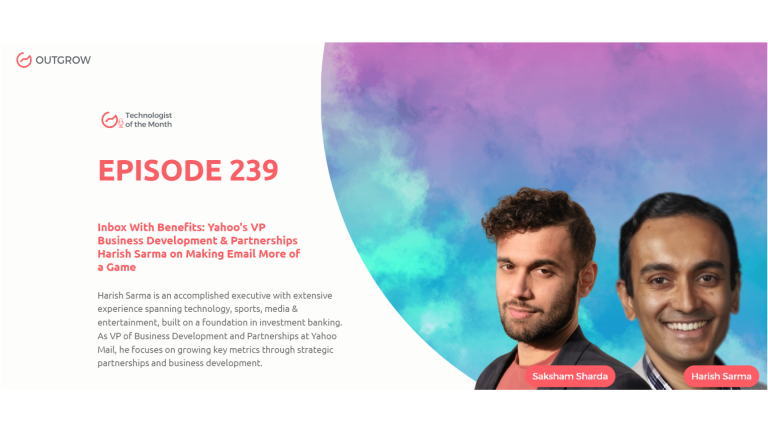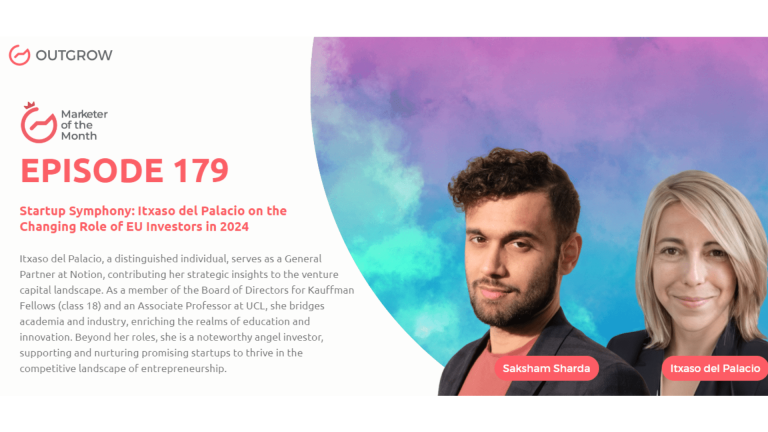Summarize with :
EPISODE 235: Marketer of the Month Podcast with Igor Mikhalev
Table of Contents
Hey there! Welcome to the Marketer Of The Month blog!
We recently interviewed Igor Mikhalev for our monthly podcast – ‘Marketer of the Month’! We had some amazing insightful conversations with Igor and here’s what we discussed about-
1. Capitalism 2.0: Stakeholder impact over shareholder returns.
2. Data vs Creativity: Art and science symbiosis in campaigns.
3. Emotional Intelligence: AI’s role in brand narratives.
4. Authentic Communication: Sincerity over corporate jargon.
5. Decentralized Technologies: Peer-to-peer value exchange revolution.
6. AI Augmentation: Enhancing human potential over replacement.
7. Measurement Revolution: GDP to well-being metrics transformation.
About our host:
Dr. Saksham Sharda is the Chief Information Officer at Outgrow.co He specializes in data collection, analysis, filtering, and transfer by means of widgets and applets. Interactive, cultural, and trending widgets designed by him have been featured on TrendHunter, Alibaba, ProductHunt, New York Marketing Association, FactoryBerlin, Digimarcon Silicon Valley, and at The European Affiliate Summit.
About our guest:
Igor Mikhalev is a Partner and Head of Disruptive Strategies at EY Parthenon globally, where he spearheads emerging technology initiatives and champions Capitalism 2.0 principles. With a vision that extends far beyond traditional business metrics, Igor advocates for stakeholder-centric models that prioritize human well-being, equity, and authentic purpose-driven connections.
Decentralize This: EY-Parthenon’s Head of Emerging Technologies Strategy Igor Mikhalev on Marketing in a Trustless World
The Intro!
Saksham Sharda: Hi, everyone. Welcome to another episode of Outgrow’s Marketer of the Month. I’m your host, Dr. Saksham Sharda, and I’m the creative director at Outgrow. co. And for this month we are going to interview Igor Mikhalev who is the Head of Emerging Technologies Strategy at EY-Parthenon.
Igor Mikhalev: Great to be here. Thank you.
Don’t have time to read? No problem, just watch the Podcast!
Challenge yourself with this trivia about the exciting topics Igor Mikhalev covered in the podcast.
Or you can just listen to it on Spotify!
The Rapid Fire Round!
Saksham Sharda: All right, at what age do you want to retire?
Igor Mikhalev: I don’t want to retire.
Saksham Sharda: How long does it take you to get ready in the mornings?
Igor Mikhalev: It takes half an hour, I think.
Saksham Sharda: Most embarrassing moment of your life?
Igor Mikhalev: Oh god, there have been too many, I cannot think of one.
Saksham Sharda: Favorite color?
Igor Mikhalev: Green.
Saksham Sharda: What time of day are you most inspired?
Igor Mikhalev: Yeah, 11 a.m.
Saksham Sharda: How many hours of sleep can you survive on?
Igor Mikhalev: Six.
Saksham Sharda: The city in which the best kiss of your life happened?
Igor Mikhalev: Amsterdam.
Saksham Sharda: Pick one, Mark Zuckerberg or Elon Musk?
Igor Mikhalev: Elon Musk.
Saksham Sharda: How do you relax?
Igor Mikhalev: Sauna and ice bath.
Saksham Sharda: How many cups of coffee do you drink per day?
Igor Mikhalev: I try not to go beyond three.
Saksham Sharda: A habit of yours that you hate?
Igor Mikhalev: Being too good to some people, I shouldn’t.
Saksham Sharda: The most valuable skill you’ve learned in life?
Igor Mikhalev: Perseverance.
Saksham Sharda: Your favorite Netflix show?
Igor Mikhalev: Oh wow, favorite… I like Severance on Apple TV, though, born on Netflix.
Saksham Sharda: Are you an early riser or a night owl?
Igor Mikhalev: I think early morning.
Saksham Sharda: Coffee or tea to kick-start your day?
Igor Mikhalev: Coffee.
Saksham Sharda: Top priority in your daily schedule?
Igor Mikhalev: Do not get wound up with many things I don’t want to do.
Saksham Sharda: Ideal vacation spot for relaxation?
Igor Mikhalev: Islands of Maldives.
Saksham Sharda: Key factor for maintaining a work-life balance?
Igor Mikhalev: Do not get too entangled with daily priorities that you don’t want to take.
The Big Questions!
Saksham Sharda: The first one is in the context of Capitalism 2.0. How do you see the role of marketing evolving from being a tool of persuasion to a vehicle of purpose-driven connection?
Igor Mikhalev: Yeah, so in the world of Capitalism 2.0, marketing should evolve into a tool of connecting people with products and should be an extension of your product as opposed to a separate team that tries to push it and persevere towards purchase.
Saksham Sharda: And how can brands shift from transactional messaging to building long-term emotional equity with customers, then?
Igor Mikhalev: Yeah, in the first place, those brands should stop trying to skim the market and just chase the new hot thing. Everything should come from your purpose and the way you, as a founding team, and you, as a management team try to address that and help people around you in the world. You believe logic should come from data.
Saksham Sharda: How can marketing teams rely less on assumptions and more on dynamic data-driven experimentation without losing creativity?
Igor Mikhalev: This is a really good question because that has both components, art and science, to it. So, science, meaning data, should be there to get a clear, centered perspective on where the world is and where it was a few days ago. But nothing can replace humans creativity or humans’ ingenuity when it comes to trying to stretch the art of the possible. So, science comes from data, art comes from humans, and the symbiosis is where the magic happens.
Saksham Sharda: So, do you have any interesting stories about when data contradicted intuition in a campaign and what the outcome was?
Igor Mikhalev: Yeah, so I don’t think I can disclose exactly, but just recently I had one of the banking clients that said, after working with them for a few years, that the most important innovation that was the leading product that they were able to bring to market came as an accident. So, no amount of structured innovation that they tried to put in their company worked as effectively as a random idea that was in the corner of somebody’s imaginative mind.
Saksham Sharda: And at the same time, you emphasize feelings over corporate jargon. How should marketers reframe their storytelling to prioritize empathy, trust, and human emotion in a digitally saturated world?
Igor Mikhalev: Yeah, people crave sincerity. People crave honesty and authenticity in your communication. So, that vulnerability that is brought by those values is something that you should be creating as you communicate with your clients. So, the message should come from your core purpose, which comes from your desire to properly help people around you, and people sense it immediately. So, as soon as this is, and as long as this is in place, communication works and it clicks really well, but people immediately sense the fakeness.
Saksham Sharda: So, what role do emerging technologies like AI play in creating emotionally intelligent brand narratives?
Igor Mikhalev: Yeah, so for a while, AI was used just as a tool of optimization. So, cross-sell, up-sell, and try to make your marketing message more polished. For example, think of booking.com, which is really adept at using AI and data to optimize, but still it is reliant on humans when it comes to setting up those experiments and imagining and dreaming up different futures where data is nothing but a supplier of the background information, and it is not limiting it in any way. So, I’m a big proponent of humans’ creativity and humans’ abstract thinking not being suppressed by data, but being augmented by it in a way that it provides a foundation for what you’re building on. In
Saksham Sharda: Capitalism 2.0, where value creation is multi-dimensional. How do you believe marketing should measure success beyond traditional KPIs like conversions or impressions?
Igor Mikhalev: Yeah, I think first of all, probably marketing will cease to exist as a separate function a few years down the road, or will morph into something else as an extension of the product that makes the natural life of people better. And in terms of measuring its effectiveness, I think first of all, we will have to reframe how we measure the effectiveness of our nations, our companies; and our people. So, we move from GDP gross domestic product to new types of measurements that include well-being, equity, prosperity, trust, reliance on others in case of need types of metrics. On the level of companies, we should be adopting impact-based measurements. So, to what extent is my company helping communities around me to thrive and prosper, not only helping shareholders to gain more value. And hence, marketing and its KPIs should also evolve in that direction. So, as we are trying to build emotional connection and sincerely help our audience, what is it that I can do to express it in the best way possible so they click as soon as possible, but this still becomes something that they’re looking for intrinsically for their own lives as a way of improving it.
Saksham Sharda: So, it’s already hard to find ways to measure marketing today. Do you think it’s going to become even harder to find ways to measure it in the future?
Igor Mikhalev: I think so. Because, hey, I think, you know, all the AI-based tools that let you quickly measure your click-through rate or help you to measure your ad value or how much you spend on ads, which are an investment in there, they will become more and more efficient. And no way humans will or should compete with that. So, absolutely, the value of marketing would more and more morph into the value of the product and the measurements, the new metrics that we discussed that will be put in place and are being put in place to complement, in this case, European society trying to move away from GDP-like and bottom-line-like measurements all the way towards more inclusive and ethical ones. You don’t distinguish between tech and business in today’s landscape.
Saksham Sharda: How must marketing evolve to become not just a communication function, but a core part of digital product and business innovation?
Igor Mikhalev: Yeah, I think in this case, basically, what it means is that the ways your products interface with clients need to be multifaceted. Of course, when we talk about tech, it means hyper-personalized; it means relatable for each and every person in as clear a way as possible. So, I think, technically, this is it. So, how can you gear the value and the message of your product all the way towards an individual person’s desires but in an ethical way. So, you’re not trying to exploit them, but you’re trying to augment and show that person a path towards a better future for themselves. So, I think that’s how the relationships change. Capitalism 2.0 emphasizes stakeholder impact over shareholder returns, as you’ve said.
Saksham Sharda: How can marketing become the internal catalyst that aligns brand purpose with employee advocacy, customer trust, and ecosystem influence?
Igor Mikhalev: Yeah. So, I think that one specific tool for that would be for marketers to use their intimate relationships with clients, their intimate understanding of what clients want, and their needs, to persuade the leaders of product teams and ultimately the leaders of companies to think differently about their audience. So, as we discussed, move away from persuasion, move away from exploiting people’s needs, move away to capturing their time out of just sincere, sheer ability to capture it as much as possible, all the way towards value-based and improvement pathway-based thinking when it comes to people’s personal lives. Because marketers know that, but sometimes product teams and leaders of companies don’t really know that. So, I think marketers have a unique position to actually turn it around by bringing that view into their companies. So, you seem to be talking about replacing rigid requirements with continuous conversations.
Saksham Sharda: How should marketers design campaigns and platforms that are not static, but adaptive, conversational, and co-created with users?
Igor Mikhalev: Yeah. Well, tech-wise, there are many tools and approaches available for that.Everything boils down to the fluidity of your business value, the fluidity of your service offering that you’re giving away to the clients. So, to what extent is that offering malleable? How quickly can you adjust it? And the conversation between product and marketing teams should be around alignment with the core values and the pathway for personal life improvement of your audience and the core product’s capabilities. So, being able to adapt it as rapidly as possible is surely the company’s advantage. But how to get there? Well, we’re not going to get into all the details of all the tools, but hey, hyper-personalization and AI-based understanding of what your users really want and what they need truly discounted for anything that can be outside of the ethical boundaries is what the conversation between marketing and product can look like in this case.
Saksham Sharda: Do you have any examples where community or user input shaped the success of a brand? Any interesting story?
Igor Mikhalev: Yeah, community or user input shaped, properly shaped the design brand. Well, it’s a difficult question because as a visionary entrepreneur or as a leader of a company or leader of a product team, you don’t really want to exactly give people what they want because this sort of nullifies your own specific forward-looking understanding of what they really need. So, I think for me, I don’t believe in just completely aligning with what users want now. I believe in this combination between what they say they want and what you understand they need, and building it together. So, to your question, do I know good examples? Well, I know really good examples of visionary founders and entrepreneurs being able to establish this conversation between their vision of the future and their users’ understanding of what they need now. And I think the magic happens in between those two. So, if users are buying into what you have to offer and your view of the future, they are willing to take some learning curve, and the magic is in this conversation. So, well, I have examples, but I’m not going to name companies.
Saksham Sharda: Could you tell us a bit more about what your typical day looks like at work? You wake up in the morning.
Igor Mikhalev: How much are the emails? How much are meetings? Oh, yeah. Cool, cool. So, my rule is that I do not let meetings take time until 12. So, until 12, I try to keep my schedule clean of anything that can sort of cloud my mind in any significant way, because if you start your day with all the meetings, you’re jumping from your bed straight into conversationsforf a couplof e hours, well, then your day is ruined. That’s how I think about it. So, in the beginning, when I wake up, which is about 7.30, I try to do a CrossFit workout. I try to do an ice bath. I try to do a sauna. So, I have like the best possible list of things that fits but it’s not a rigid list. You know, it changes. No, the only rule of thumb is that I try to keep the thinking time and the body time until about 12, and then I jump into conversations and discussions, and around about six, I’m done with that. So, that’s the time for some thinking and emails for a few hours, and then, yeah, I try to disconnect, and that’s more or less my day.
Saksham Sharda: All right. Back to the serious question, then. You say you’re not proud of budgets or degrees, but meaningful outcomes. What, in your view, makes a marketing campaign meaningful in today’s economy?
Igor Mikhalev: Yeah. So, I think marketing campaign is meaningful when it is not pushing something on the basis of pure fear or pure, sheer quick dopamine to people but when it truly helps them to understand the path to making their world a better place and make their lives better and they appreciate the knowledge, they appreciate the insights, they appreciate the connection and they got away something from the campaign even if they didn’t buy or didn’t engage, they still get away something that they’re like this is cool for me, this is good for my life, this is good for my community and if next to that they bought a product or they know about the product, I think that even doesn’t really matter. So, if you impact people and people know about your brand, you are a helpful leader in their environment when it comes to your expertise, and I think that’s a marketing campaign perfectly, and if people want to buy or engage, I think that’s bonus points.
Saksham Sharda: So, what kind of skills are you looking for when you’re hiring new people into the marketing teams or in general for strategies?
Igor Mikhalev: Yeah. I’m looking for people who know from beginning to end how to get things done and so the attitude for excellence, the attitude for getting things done properly, and a generalist mindset. So, somebody who is not limited to one field of thinking and somebody who’s not trying to maximize this one little quality that they have.So, I need a generalist mindset, a few spikes of tech knowledge, the ability to execute, a drive for excellence, and disability for end-to-end type of thinking, finishing things. And what’s your perspective on the impression that AI is going to kill entry-level jobs? Yeah. I think this will be the case. It will be the case. The question is how we as humans can make that wave of technological advancements that frees up a lot of efficiency money back into the world of business. How can we make that not make the rich even richer and the poor even poorer? How can we shrink? How can we close the gap of inequality and the gap of income with that. Because with this thinking, that, hey, AI is out there to replace me and on the other side, technologists are like, how do I build AI that replaces people. I think this isthea wrong way of thinking. Probably it came all the way back to Alan Turing which thought a lot about it as like, well, can I sort of, you know, fool people into thinking that AI is a person and if this is successful, then I’m successful too, which goes back into his arguably hard past where he’s been tried as a gay person by British agencies back then. It was not possible to be gay back then in the UK. So, basically, I think that gave him a certain trauma, and he started thinking about the same way when it comes to machines. So, how can I test that machine to make sure that this machine passes or not the test of being a human? And now with all that, we are so much tied into thinking about replacing people. I am more of a school of thought that we should absolutely be thinking about augmenting people’s potential. So, even people with entry-level jobs should not be fearing to be replaced, but they should be thinking about how do I improve the way they’re doing things. How do I shift my life into a better situation? Because now I can do more things and I can do them with more creativity. I can do them with more abstract thinking, which is always a reward to apply as a professional. So, yeah, the question is, how do we divert from the fear of being replaced? How do we not build machines to replace humans? And how do we make sure that this gives people an opportunity to grow and prosper? And I hope that the new generation of AI will be used for that very purpose.
Saksham Sharda: With your background in emerging technologies, what marketing innovations or trends do you believe will define the next decade of capitalism 2.0?
Igor Mikhalev: Yeah, so I’m particularly excited about two things in terms of tech. I’m excited about decentralized technologies because the first time in history we showed that we don’t really need a trusted intermediary to hold hands when we are exchanging value, right? So nobody needs to say, well, and now I’m in between, so therefore pay me for not screwing each other over. And now we have opportunities to build extremely complicated akin to the current financial services infrastructure products and services that are delivered on a peer-to-peer fashion, which completely changes the way value exchange is done in our lives, in our society, which means everything from central banking to commercial banking to lending and payments, everything is going to be changed. And this frees up so much back into people’s hands and gives so much back in terms of power that people will regain, right? Think about it also from the perspective of, hey, now we have all the different big platforms, ride-sharing marketplaces that hoard our data, and they are owning the karma, or let’s say the reputation points of people and providers. How about we give it back to people through decentralized technologies, and we let them still cooperate around value exchange, right? And this prosperity that we bring back to people, I think, is a major, major milestone for our society. And the next one in terms of all the efficiencies that come nowadays with the new wave of AI, well, again, as we just discussed, I’m hoping that we’re going to be using them to close the inequality gap and to advance ourselves in terms of satisfaction that comes from abstract thinking and creativity, as opposed to just trying to push that narrative of, well, let’s do a zero-person banking, zero-person support teams, etc.
Saksham Sharda: The last question for you is of a personal kind. What would you be doing in your life if not this?
Igor Mikhalev: Nothing. So I’m doing this because I love this and I really enjoy changing the world for the better. I enjoy helping people on the path. So what I’m doing is nothing but a path of self-discovery and a path of helping other people and beings find their nature. I love helping them find their nature through what I know best. And it happens so that I know technology and business science, and all of this can be put in place to help people find their nature and discover their own self. This is my path, this is my journey, and I’m not thinking of doing anything else but that. Of course, I wish that sometimes I could drop a few commercial projects I don’t really like, but honestly, nowadays I’m almost perfect with my portfolio of projects, and I don’t think I have any at this very moment, the ones that I don’t want.
Let’s Conclude!
Saksham Sharda: Thanks, everyone for joining us for this month’s episode of Outgrow’s Marketer of the Month. That was Igor Mikhalev who is the Head of Emerging Technologies Strategy at EY-Parthenon.
Igor Mikhalev: Great to be here. Thank you.
Saksham Sharda: Check out the website for more details and we’ll see you once again next month with another marketer of the month.

Muskan is a Marketing Analyst at Outgrow. She is working on multiple areas of marketing. On her days off though, she loves exploring new cafes, drinking coffee, and catching up with friends.









